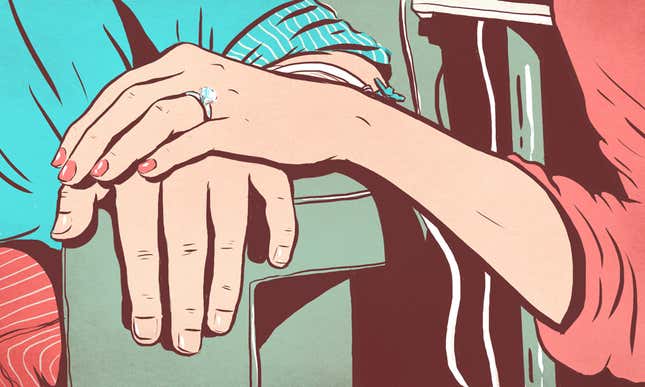What It's Like When Your Fiancé Has Cancer
In Depth

When I first heard the word that would give me rage palpitations, I was sitting in a chair in a doctor’s office, quietly tearing off the label on my water bottle. When I’m nervous, I rip things to shreds.
The occasion was truly nerve-wracking: I was about to find out whether my boyfriend had cancer. But even before we had the diagnosis, before we even considered the word “chemo,” I knew that my life was about to change in irreversible and terrifying ways. Then I heard the word and it washed all thoughts of death and illness from my mind, replacing those huge fears with one shallow thought: Don’t fucking call me that.
The nurse had asked a simple question, one I don’t remember now, but I do remember how it began: “As the caregiver…” Caregiver. Caregiver. In the span of two weeks, I had been transformed from girlfriend—a term that bounces off the tongue with frivolity and fun—into a “caregiver.” The new title stuck hard and fast, like a pill swallowed down a dry throat. It lit a blaze of anger inside me, a defiant flame that still hasn’t quite burnt out.
The road to cancer was as swift as it was cruel. It all started with a strange lump near Garrett’s left collarbone. He noticed it when we were canoeing and thought it was a problem with his muscle, one that would go away with a little yoga and rest. Two months later, he finally saw a doctor, a bone-and-muscle guy. He took one poke at the strange lump and told Garrett to book an MRI. “It’s a lymph node, not a muscle,” the doctor said, as though it were obvious. Two weeks later, after the test had been completed, the doctor called him with the results. “Are you at home?” he asked. “Are you sitting down?”
Garrett’s tumor was larger than a quarter and semi-hard. It rolled around under his skin when I touched it; its mobility and strange texture made me nauseous. (Much later we learned that the mass was marbled gray and yellow, sickly colors fitting for the tumor’s calamitous nature.) The MRI showed several other growths in his chest, but we didn’t know whether they were malignant. We wouldn’t know until after he had gone through surgery to biopsy the “growth,” as they were calling it then. We wouldn’t find out the name of his disease for weeks, though I had familiarized myself with the possibilities. Hodgkin’s Lymphoma. Stage II. Unfavorable.
In a few short weeks, I went from being the girlfriend of a man while a slightly painful shoulder to the caretaker of a man with blood cancer. Trust me when I tell you: that’s the kind of transformation that makes your head spin ferociously. It’s the kind of shock that makes your stomach hurt constantly, tied in anxious knots. It makes you feel dizzy with anger and exhausted with grief. You manage to forget it for a moment, and then it hits you again, a sucker punch to the gut. Cancer. Cancer. Cancer.
But of course, life goes on, as it does. You make a treatment plan. You drive down to Boston to talk to a specialist at Dana Farber, where you hope to find more hope. He wears a dark and somber suit and his impeccably trimmed beard lends him an air of confidence and precision that you find comforting. You become accustomed to hospitals and their strange smells and their terrible color palates, all gray-tinged mauves and weak-willed turquoises. You spend some time crying, sure, but you also spend time drinking on your porch as an unseasonably warm May brings beads of sweat to your chest and a tan to your shoulders. You fight with your sick boyfriend, because sometimes even sick people are assholes. You laugh and you have sex, familiar and joyful, limbs twisting happily around each other. He’s not dead yet. Neither are you.
In Illness as Metaphor, Susan Sontag wrote:
Illness is the night-side of life, a more onerous citizenship. Everyone who is born holds dual citizenship, in the kingdom of the well and in the kingdom of the sick. Although we all prefer to use the good passport, sooner or later each of us is obliged, at least for a spell, to identify ourselves as citizens of that other place.
But what this brilliant quote doesn’t tell you is that when you fall ill, the people who love you are forced to use their passports, too. We may feel like expats in a country not our own, but we’re there. Interlopers in the land of suffering. As soon as Garrett was diagnosed, I received a stamp of my own. I proceeded to the waiting area, which is where you hang out when someone is sick. The entire process of cancer involves a lot of waiting and waiting and waiting. We waited to talk to doctors; we waited to see nurses. We waited to get the results of each new test—one for his blood, one for his lungs, and one for his heart.
-

-

-

-

-

-

-

-

-

-

-

-

-

-

-

-

-

-

-

-

-

-

-

-

-

-

-

-

-

-

-

-

-

-

-

-

-

-

-

-








































